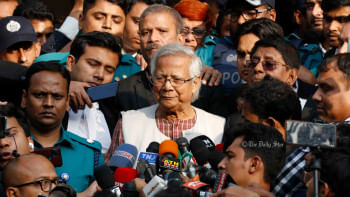The Bhumi Oporadh Protirodh o Protikaar Ain 2023

Mohammad Towhidul Islam is a Professor of Law at the University of Dhaka. He received his PhD in intellectual property from the Macquarie University, Australia. He also holds an LLM in international human rights from the UEL, UK and an LLB (honours) and an LLM from the University of Dhaka. He authors several popular textbooks including Land Law: Text, Cases and Materials and Lectures on Company Law. He published a monographic work on intellectual property in the UK. His scholarly journal articles and book chapters get published by world's leading publishing houses including Oxford University Press, BRILL, Springer, and Thomson Reuters. Law Desk speaks with him on the recently passed Bhumi Oporadh Protirodh o Protikaar Ain 2023:
Law Desk (LD): What do you think prompted the lawmakers to enact the Bhumi Oporadh Protirodh o Protikaar Ain 2023?
Towhidul Islam (TI): The preamble to the Bhumi Oporadh Protirodh o Protikaar Ain 2023 indicates that the legislative objective is "rapid disposal" of land-related issues. The succeeding clauses, however, seem to contradict this assertion, as there is no mandate for a completely independent mechanism/tribunal system for trying land disputes. Rather, the Act assigned responsibilities to first-class magistrates and executive magistrates for disposals. In addition, the time limit for disposal (180 days) specified in section 19 seems to call for a great deal of procedural complications. Consequently, the purpose of "rapid disposal" is not reflected consistently in the statute.

LD: What are your opinions on the provisions of penalty in the Act? Do you think punishment indeed would do the job (i.e., reduce land-related disputes)?
TI: Land disputes are distinctive by their very nature and demand specific consideration. However, punishing may not be the best strategy to reduce land-related disputes because they are not always intentional. There is no actual intention to conduct fraud or deceit when, for instance, the heirs of land sue one another for ownership of the land of their choosing (acquired from a common ancestor), despite the fact that they are suing for ownership of the property. Therefore, it is inappropriate to chastise them in such situations. The law, however, failed to take into account these social and cultural characteristics, and traditions of Bangladesh by simply punishing individuals. For instance, the owner of any undivided property might be easily prosecuted for deception under sections 4(1) (a) or (c).
In addition, the majority of the Act's penal mandates are already covered by the Penal Code 1860, and there are also existing civil law mandates (Specific Relief Act 1877 and Transfer of Property Act 1882) to deal with these issues. In fact, the aforementioned laws contain penalties that are sometimes more severe than this new law.
Moreover, the fundamental principle of civil law is "where there is a wrong, there is a remedy." This remedy signifies protection of the right and compensation for a violation of the right. Punishing the culprit is not truly restorative compensation for the victim whose rights have been violated. Therefore, punishment cannot be the solution to land disputes.
LD: How does this Act map the relationship between the executive and the judiciary?
TI: The executive and the judiciary are two essential governmental organs, and it is imperative to maintain a healthy relation between the two. Unfortunately, this Act endowed executive magistrates with judicial authority. This will intensify the ongoing debate concerning the exercise of judicial authority by non-judicial minds. Since the functioning of the mobile courts have already been condemned by our courts and is the subject of great debate, this statute should have been examined more cautiously before adding section 22 and thereby enhancing mobile court's powers. This parallel function of executive and judicial bodies with regard to the same subject-matter would dissatisfy both, and the legislation's noble objective is likely to be impeded.
LD: How do you think the newly enacted legislation fits within the overarching legal framework on land laws in Bangladesh?
TI: The Act continues to apply concurrently with the other existing land laws of the country, per section 3. It prescribes the trial and punishment of land disputes, despite the fact that these are already covered by other civil laws. For instance, a criminal prosecution could be brought for "recovering unlawful dispossession" under section 8. It is already the subject of legal litigation under the Specific Relief Act. Moreover, as per section 8(7), this clause does not apply if a civil suit is pending. What happens, however, if a person is penalised under section 8 and a lawsuit is filed under the Specific Relief Act for the same matter? Consequently, the parallel mandate involving the same topic will prolong the procedure and cause parties to endure multiple proceedings.
Since land-related regulations were enacted centuries ago, they are no longer effective and could be adjusted expeditiously. However, criminalising land conflicts create an odd situation. For instance, as section 7 prohibits the retention of land without khatiyan or valid ownership, landless people residing on khas lands may be subject to a penalty. Landless people have no legal rights to khas land other than the fact that they have lived there for long period. Sections 11 and 12 also contain similar mandates for the occupation of land by the landless and marginalised people, and they could also be punished. As a result of its overlapping nature and vagueness, the Act does not appear to fit into the existing land law system. We already know that civil courts handle land-related matters, whereas the land survey tribunal handles certain demarcation, measuring, and survey concerns. Nonetheless, the survey tribunals and appeal tribunals are barely operational at present. Therefore, the involvement of executive magistrates in land offenses will further complicate the structure. This would result in a rise in the number of proceedings, which would be detrimental to the common people seeking a remedy.
LD: How do you view the new Act in the context of the three hill districts that have traditional land management systems?
TI: The final text of the Act omitted any explicit language about the land rights in the hill districts. Typically, in the hill districts, the people receive a settlement and land rights from their traditional chiefs. The applicability of this law to the indigenous population of hill tracts remains unclear because this Act neither mentions nor excludes its applicability to those places. Without such an unequivocal obligation, hill tract landowners could readily be punished as unlawful state landholders under sections 11 and 12.
LD: Are there any parallels of this Act in other jurisdictions? If yes, would you please briefly compare (and contrast) our Act with those of the other countries?
TI: In various regions of the world, there exist specific laws governing land crimes. In India, for instance, the Benami Transactions (Prohibition) Act, 1988 criminalises benami transactions to prevent black money from being used to purchase properties in the name of benamders. It should be mentioned that, in India, any tribunal, whether judicial or quasi-judicial, must be composed of judicial officers and relevant expert members, who are able to apply judicial reasoning while deciding cases.
In India, the subject of land grabbing is primarily addressed by the Indian Penal Code sections pertaining to trespass, mischief, deceit, and criminal intimidation. In addition, the Indian states of Gujarat, Karnataka, and Andhra Pradesh have laws prohibiting land grabbing, notwithstanding the lack of a federal statute banning land grabbing. The Act of Andhra Pradesh, for instance, makes land appropriation and unlawful possession criminal by up to five years in prison. Our 2023 Act aims for rapid disposal but vests the authority of adjudication upon the existing courts in addition to their current duties, which contradicts its very objective.
In Pakistan, the Illegal Eviction Act of 2005 imposes prison terms of up to 10 years in addition to fines and restitution for land appropriation and unlawful dispossession. In contrast to the Pakistani law, which merely penalises "illegal possession" in a broad sense, the Bangladeshi Act of 2023 categorises offenses in multiple ways. Surprisingly, none of the preceding jurisdictions delegate judicial authority onto the Executive Magistrates, as is the case with Bangladesh. Unresolved is the question as to how Executive Magistrates without legal expertise could handle intricate land-related issues.
Some land-related issues are also criminalised in Indonesia. The maximum penalty for unlawful usage, possession, and use of land is three months in jail and a fine. The Indonesian Criminal Code penalises unauthorised occupancy with a maximum imprisonment of four years. Therefore, the difference between Indonesian law and Bangladeshi law appears to be the less harsh punishment in Indonesia. Nigeria has made unauthorised land acquisition and occupation punishable by up to ten years in prison, which is a harsher penalty than ours (as per the 2023 Act) but is triable by judicial members, unlike Bangladesh.
The new law in Bangladesh, grants Executive Magistrates the authority to adjudicate land crime cases. Interestingly, the AC (Land), who is also an Executive Magistrate, is only authorised to fix clerical errors in the khatiyan. If a problem relating to title disputes arises, the AC (Land) is not authorised to handle it; instead, it is to be adjudicated by regular civil courts, and erroneous recording issues are to be handled by the Land Survey Tribunal, which is presided over by a judicial officer.
In addition, around 1200 laws have been adopted in the country, but their execution is regularly questioned. For instance, section 143B of the State Acquisition and Tenancy Act 1950 provides for mutation upon inheritance as requiring the successors to reach a consensus, prepare the partition deed, have the deed officially signed and registered, and present it to the AC (land). However, in numerous instances, the AC (land) accepts the mutation application upon receipt of the inheritance certificate. Very recently, a land ministry notification was sent to the AC (land) with the directive to strictly adhere to the legal conditions of mutation upon inheritance.
Therefore, some similar legislation may exist in other jurisdictions. However, all have their own unique structure for addressing land-related crimes. Unlike them, our Act blatantly criminalises land-related civil disputes while simultaneously applying civil remedies. Therefore, it is exceedingly difficult to assume that this Act will facilitate the speedy resolution of land crimes.
LD: Thank you for your valuable time.
TI: Thank you!

 For all latest news, follow The Daily Star's Google News channel.
For all latest news, follow The Daily Star's Google News channel. 




Comments